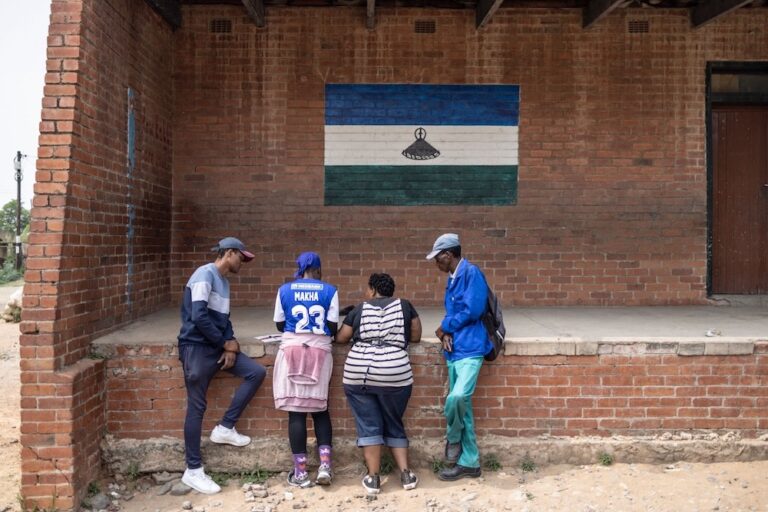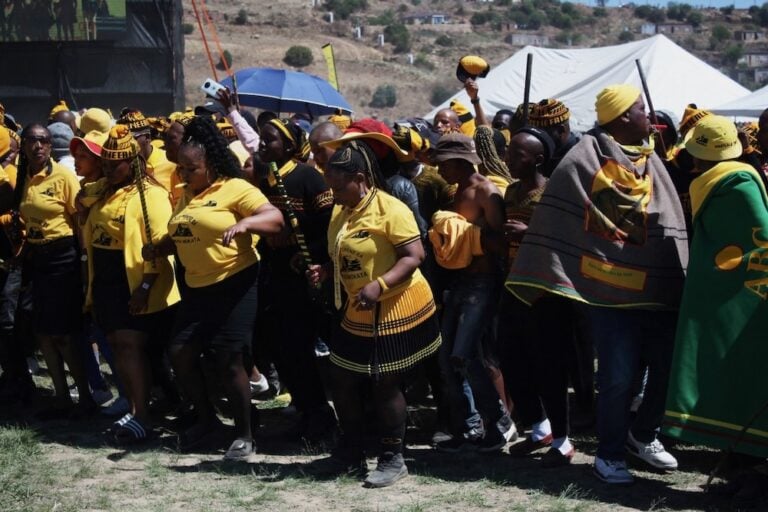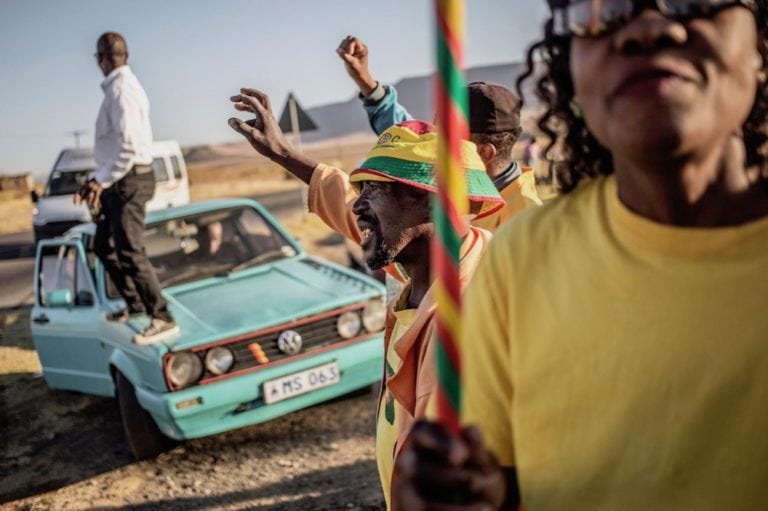(MISA/IFEX) – The Director of Public Prosecutions (DPP) in Lesotho is currently examining evidence with a view to possibly charging the editor of “MoAfrika” magazine, Candi Ramainoane, following the publication of several articles criticising a court martial underway in the country. **Updates IFEX alerts of 27 January and 21 January 1999** The matter was referred […]
(MISA/IFEX) – The Director of Public Prosecutions (DPP) in Lesotho is
currently examining evidence with a view to possibly charging the editor
of “MoAfrika” magazine, Candi Ramainoane, following the publication of
several articles criticising a court martial underway in the country.
**Updates IFEX alerts of 27 January and 21 January 1999**
The matter was referred to the DPP by Judge Advocate Peter Cullinan, who
is the advisor to the five army officers presiding over the court
martial in which fifty Lesotho Defence Force (LDF) members are facing
charges of mutiny. Earlier, Cullinan summoned Ramainoane to appear
before the court martial and apologise for articles published in
“MoAfrika” on two consecutive weeks which cast doubt on the court
martial’s ability to administer justice. Cullinan had demanded both a
written and oral apology from Ramainoane because of the articles.
The journalist was initially supposed to appear before the court martial
on 28 January 1999, but was later informed that he should appear on 29
January. However, Ramainoane was out of the country attending an
international conference in Johannesburg on that day, and his lawyer
apologised to the court for his client’s failure to show up. He
submitted that it was not out of contempt or disrespect for the court
that his client had failed to turn up before the tribunal. Cullinan
subsequently referred the matter to the DPP
for a decision on any further action with a possibility of the writer
being charged. The court martial has no summary powers over civilians,
hence if the court finds “MoAfrika” to be in the wrong, it will be dealt
with by a civil court. The DPP is expected to decide on any action
against the journalist by 11 February.
Meanwhile, on 26 January, Ramainoane was granted an opportunity to
address the tribunal regarding the harassment that journalists faced at
the security checks at the entrance to the prison compound in which the
court martial was being held. “Mopheme” newspaper reports that
Ramainoane related his personal experience to the court, when he was
almost manhandled by an army officer who refused him entry to the
compound. The court was also told of how one journalist lost a cellphone
after it was taken by the army guards at the gate but was missing on the
journalist’s return.
Background Information
In the week of 27 January, Ramainoane was called upon to appear, with
his lawyer, before Cullinan on charges of contempt of court regarding
articles published in the two previous weeks’ issues of “MoAfrika”.
Ramainoane was not present at court at the time that he was summoned to
appear.
He later told the Media Institute of Lesotho (MILES) that he was very
concerned about the shape that the court martial was taking. “It seems
that this is harassment directed towards the media, particularly towards
‘MoAfrika’ newspaper and its sister radio MoAfrika FM,” he said.
“I was not in court when Justice Cullinan announced that I was to appear
before him on the 28th of January. I have not been informed that I have
disrespected the court in any way. Furthermore, I will not appear before
court without being given written summons, especially because I don’t
even know what I am being accused of that is so grave as to warrant the
presence of my lawyer,” Ramainoane said.
On 19 January, Ramainoane was denied access to the court martial. He
said that at about 9 a.m. (local time), the time when journalist are
permitted to enter the court martial, he approached the entrance and was
immediately halted by a military police (MP) officer. When he asked why
he was being denied entrance, he was told that “orders are that you are
not to be allowed in” and he was further ordered to stand to the side.
Ramainoane reports: “All hell broke loose when I began to interview
people as they stood outside the entrance prison grounds. One MP Liaison
Officer ordered me to move away and I refused. Then he threatened to
beat me up and I said I would still not move.”
After refusing to identify himself to Ramainoane and to say who had
given him orders that he should not be allowed into the court martial,
the MP left him alone. However, Lt. Tanki Mothae, public relations
officer for the LDF, later confirmed to MILES that the order barring
Ramainoane from the court martial had been issued by him. He said
Ramainoane had broken rules regulating court martial proceedings by
interviewing some of the accused soldiers.
Ramainoane countered by saying that he had not been informed or warned
that he had broken such rules but instead had been pushed and threatened
with assault by those at the entrance.
Mothae said that it would have been an “unlawful act for a member of the
LDF to physically abuse a civilian and it would have been clumsier still
if that civilian were a journalist.” He further said that Ramainoane
would again be allowed to report on the court proceeding if he “gave
assurance that he would refrain from interviewing the accused.”
Ramainoane told MILES that he felt he was being singled out because he
reported negatively about the LDF’s high command; the irregular manner
in which the court martial was being conducted; and the irregularity of
the case actually being tried in a prison ground. He also said that he
had been made privy to a plan to murder the arrested soldiers on Monday
18 January and had subsequently broadcast this information on MoAfrika
FM radio station.


